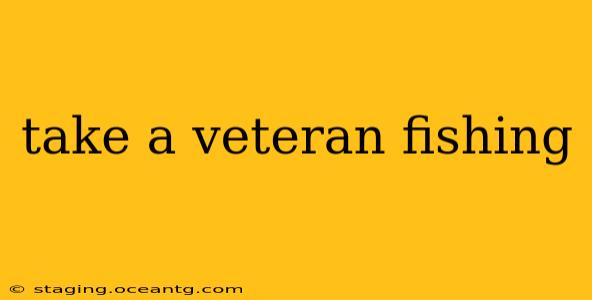Taking a Veteran Fishing: A Guide to Creating a Meaningful Experience
Taking a veteran fishing isn't just about reeling in a big catch; it's about offering a day of respite, camaraderie, and connection. For many veterans, the peace and quiet of the outdoors can be profoundly therapeutic, offering a much-needed break from the stresses of daily life. This guide will help you plan a memorable and meaningful fishing experience for a veteran.
What are the best places to take a veteran fishing?
The ideal location depends on the veteran's physical capabilities and preferences. Consider accessibility, the type of fish available, and the overall ambiance. A calm, secluded lake might be preferable to a bustling ocean pier. Look for locations with accessible fishing docks or piers, shaded areas for rest, and readily available restrooms. State parks often offer excellent accessible fishing locations with beautiful scenery. Research local fishing regulations and obtain the necessary licenses before heading out. Consider contacting local fishing clubs or veterans' organizations; they often have established relationships with locations that cater to veterans' needs.
What kind of fishing equipment should I use?
Choose equipment that's easy to use and manage. Lightweight rods and reels are generally preferred, especially for veterans with limited mobility. Consider using a rod holder to reduce fatigue. Pre-tied fishing lines and readily available bait simplify the experience. Always have extra tackle on hand in case of breakage or loss. Most importantly, ensure all equipment is in good working order.
How can I make the fishing trip accessible for veterans with disabilities?
Accessibility is paramount. If the veteran uses a wheelchair or has mobility issues, choose a location with accessible ramps, paths, and fishing piers. Ensure the chosen boat (if using one) has adequate space and support for wheelchairs or other mobility aids. Partner with organizations specializing in adaptive fishing if needed; they can provide specialized equipment and assistance. Remember, the goal is to make the experience enjoyable and inclusive.
What are some things I can do to make the experience more enjoyable and relaxing for the veteran?
Beyond the fishing itself, focus on creating a relaxing and comfortable atmosphere. Bring along sunscreen, insect repellent, hats, and plenty of water. Pack snacks and drinks that the veteran enjoys. Engage in conversation, sharing stories, and listening attentively. Respect their pace and allow for breaks as needed. The shared experience and conversation are often as valuable as the fishing itself.
Are there any specific considerations for veterans with PTSD or other mental health challenges?
Veterans with PTSD or other mental health conditions may require extra sensitivity and understanding. Be mindful of loud noises and sudden movements. Maintain a calm and reassuring presence. Allow them to set the pace and avoid pressure to perform. If the veteran expresses discomfort or needs a break, respect their wishes without judgment. Consider connecting with veteran support organizations for additional guidance and resources.
What are some resources available to help organize a fishing trip for a veteran?
Several organizations dedicate their efforts to providing fishing opportunities for veterans. Research local and national veteran support groups, fishing clubs, and adaptive fishing organizations. Many offer organized fishing trips or can provide valuable guidance and resources for planning your own outing. These organizations often have established relationships with accessible locations and can offer support to ensure the veteran has a safe and enjoyable experience.
Remember, taking a veteran fishing is about more than just catching fish; it's about showing appreciation, creating a positive experience, and fostering a sense of community. By planning thoughtfully and showing genuine care, you can make a significant and lasting impact on the veteran's well-being.
